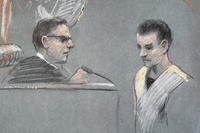Joint Chiefs Chairman Marine Gen. Joseph Dunford indirectly but strongly rejected Thursday the campaign statements of Republican presidential frontrunner Donald Trump that "torture works."
Put on the spot about Trump's remarks by Rep. Betty McCollum, a Democrat from Minnesota, Dunford didn't respond directly but made clear that torture was out of bounds for a military that embodies American values.
"One of the things that makes me proud to represent this uniform is that we represent the values of the American people," the general said in testimony before the House Appropriations Defense Subcommittee. While he never mentioned Trump's name, he said, "When our young men and women go to war, they go with our values."
Dunford added, "When we find exceptions," and U.S. troops abuse prisoners, "you can see how aggressively we address those exceptions. We should never apologize for going to war with the values of the American people. That's what we have done historically, that's what we expect to do in the future. And again that's what makes me proud to wear this uniform."
McCollum appeared to stun the committee and Defense Secretary Ashton Carter in forcefully calling for comment from Carter and Dunford on Trump's statements that as president he would authorize methods for the interrogation of prisoners and terrorist suspects that went well beyond waterboarding, which has been banned by President Barack Obama.
In a campaign appearance in South Carolina last week, Trump said that he supported waterboarding and similar interrogation techniques because "torture works" in the questioning of terrorists.
"Don't tell me it doesn't work -- torture works," he said. "OK, folks? Torture -- you know, half these guys [say]: 'Torture doesn't work.' Believe me, it works. OK?"
In posing her questions, McCollum said the panel was deliberating on funding for the military that would be available for the next president, and "a leading candidate for president is telling the American people and the world that torture works. He says he will use torture to help defeat" the Islamic State of Iraq and Syria, or ISIS, she said.
"I find these rants frightening and dangerous to our nation," McCollum said. She asked Carter and Trump, "Do you support allowing U.S. troops or the intelligence community to use torture?"
Carter sought to avoid the question. It was a "fair question," he said, but "I feel very strongly that our department needs to stand apart from the electoral season so I respectfully decline to answer any questions that arise from the political debate going on."
Carter said that Dunford as a uniformed officer was under even more constraints, but the general seemed eager to answer. Carter relented and said that if Dunford commented on the "general question of how we try to conduct ourselves as a military -- that's fine."
When Dunford concluded his remarks, McCollum said "Mr. Chairman, I'm assuming the values of the American people do not include torture."
Rep. Rodney Frelinghuysen, a New Jersey Republican and chairman of the committee, said "I agree," and then quickly sent the questioning to another lawmaker.
Should Trump become president and he authorize the use of torture in interrogations, it may require U.S. troops to put themselves in jeopardy by violating Uniform Code of Military Justice prohibitions on the use of torture and prisoner abuse in general.
The Army and Marine Corps field manual on counterinsurgency, FM 3-24, which was co-authored by then-Gen. David Petraeus, also warns against prisoner abuse and harsh interrogation techniques under the section on "Ethics."
"Article VI of the U.S. Constitution and the Army Values, Soldier's Creed, and Core Values of U.S. Marines all require obedience to the law of armed conflict. They hold Soldiers and Marines to the highest standards of moral and ethical conduct," the manual states.
"No person in the custody or under the control of DOD, regardless of nationality or physical location, shall be subject to torture or cruel, inhuman, or degrading treatment or punishment, in accordance with, and as defined in, U.S. law," the manual states.
-- Richard Sisk can be reached at Richard.Sisk@Military.com.




























